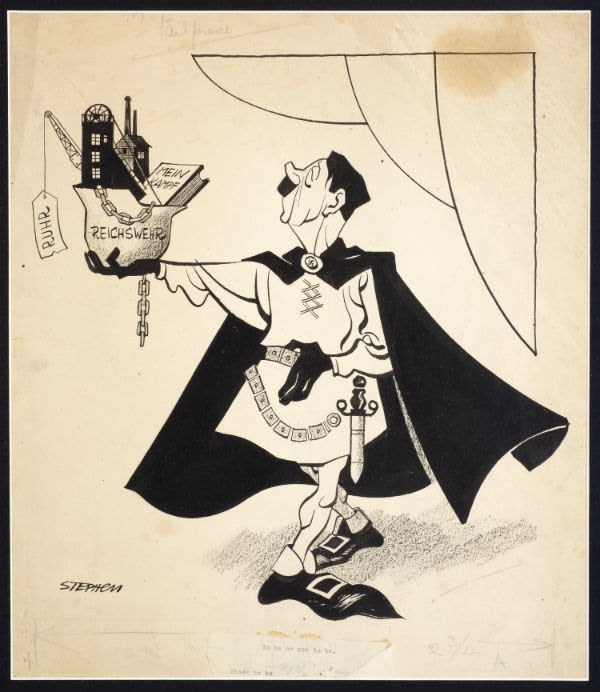Cartoonist and illustrator Stephen Roth was born Štefan Roth into a Jewish family in Slovakia in 1911. In 1931 he moved to Prague where he drew sports cartoons, joke illustrations and portraits for various papers and magazines, signing his work ‘Pista’ (pronounced 'Pishta' from the Hungarian for Stephen). In 1935 he became Political Cartoonist on the anti-Nazi weekly 'Demokraticky Stred', edited by Dr H. Ripka (later head of the Czechoslovak Propaganda Department in London during the Second World War).
Forced to leave Czechoslovakia in 1938, Roth travelled to Poland, then Sweden before arriving in London only days before war broke out in September 1939. By 1941 he was contributing political cartoons to the Ministry of Information, Central European Observer and the Free Norwegian newspaper Norsk Tidend. His popular series 'Acid Drops' began to appear in the Sunday Pictorial in 1942. He also contributed to the Star, Lilliput, Daily Mirror, Central Press, Courier, Daily Mail (sports cartoons) and others. The Czech premier Jan Masaryk wrote a Foreword to Roth’s book, 'My Patience is Exhausted' (1942), and in 1943, he published a book of anti-Nazi cartoons called 'Divided They Fall'. In 1944, together with Pelc, Walter Trier, and Z.K., Roth (signing his work as ‘Stephen’), contributed drawings to a book of Adolf Hoffmeister's cartoons entitled ‘Jesters in Earnest’, with a forward by cartoonist David Low. He also published a book of anti-Hitler cartoons called 'Finale' with the Hitler image 'To Be or Not to Be' (Ben Uri Collection). In 1961 Roth began contributing two series of portrait cartoons - 'The Face is Familiar' and 'Man in the City' - to the London Evening News. Stephen Roth died in London, England on 4 February 1967. His work is in UK collections including the Wiener Library and the University of Kent, as well as the Swann Collection in the Library of Congress, USA. In 2013 the Wiener Library in London organised an exhibition of Roth's anti-Nazi cartoons.


